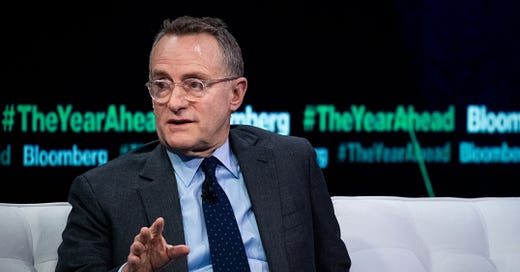The Most Important Thing: A Masterclass in Thoughtful Investing by Howard Marks
Insights on navigating markets with clarity and caution...
Hi, Investor 👋
I’m Jimmy, and welcome to another free edition 🔓 of our newsletter. Today, we’re diving deep into The Most Important Thing by Howard Marks—a timeless classic that redefines how we think about investing.
We’ll break down the key lessons Marks shares, explore why his approach remains essential in today’s market, and discuss how these principles can help you navigate uncertainty while staying ahead of the curve.
In case you missed it, here are some recent insights:
NVIDIA (NVDA) Stock Analysis: A Deep Dive Into Its Future Growth Potential and Market Dominance
I'm Buying Uber. Here's Why: Uber Technologies, Inc. ($UBER) Deep Dive
Subscribe now and never miss a single report:
Investing is a blend of art, science, and psychology—a pursuit that requires not just knowledge but also the discipline to think differently.
In The Most Important Thing, Howard Marks, the co-founder and chairman of Oaktree Capital Management, distills decades of investing experience into a thoughtful guide on how to navigate the markets with clarity and insight. Lauded by Warren Buffett as "a rarity, a useful book," Marks’ work is a must-read for anyone looking to refine their investment strategy and mindset.
The Essence of Second-Level Thinking
One of the central themes of the book is the concept of "second-level thinking," which sets successful investors apart. Marks describes second-level thinking as the ability to think beyond the obvious.
While first-level thinkers see a good company and rush to buy its stock, second-level thinkers delve deeper: Is the company truly undervalued, or is the market already overestimating its worth?
Second-level thinking is inherently contrarian and requires a willingness to go against the grain. Marks illustrates this with simple but powerful examples:
“First-level thinking says, 'The outlook is poor, let’s sell.' Second-level thinking says, 'The outlook is poor, but it's not as bad as everyone thinks—buy.’”
This mindset demands not only a deep understanding of market fundamentals but also the emotional fortitude to act decisively when others are paralyzed by fear or driven by greed.
Found this content valuable? Share it with your network! Help others discover these insights by sharing the newsletter. Your support makes all the difference!
Risk: The Elusive Enemy
If there’s one overarching message in The Most Important Thing, it’s that understanding and managing risk is more crucial than chasing returns. Marks dismantles the oversimplified notion that higher risk equates to higher returns. Instead, he emphasizes that risk involves uncertainty—the possibility that outcomes will diverge significantly from expectations, including the potential for loss.
What makes risk particularly tricky, Marks notes, is its subjective nature. Two investors might view the same asset differently: one as a high-risk gamble, the other as a safe bet. Marks offers a nuanced perspective:
“The greatest risk doesn’t come from low quality or high volatility. It comes from paying prices that are too high.” - Howard Marks
By this logic, even the highest-quality assets can be risky if purchased at inflated prices, while seemingly risky assets might offer safety if bought at a significant discount.
The Price-Value Relationship
At the heart of Marks’ investment philosophy is the relationship between price and value:
“No investment is so good that it can’t be a bad investment if bought at too high a price.” - Howard Marks
This simple yet profound insight underscores the importance of valuation. Marks argues that successful investing isn’t just about identifying great companies or promising opportunities—it’s about buying them at the right price.
The interplay between price and value ties directly into Marks’ observations about market psychology. In periods of euphoria, prices often outpace value, driven by optimism and greed. Conversely, during market downturns, pessimism can drive prices well below intrinsic value. Recognizing these misalignments is where disciplined investors can find their greatest opportunities.
Enjoying the content? Don’t miss out on more exclusive insights and analyses. Subscribe to the newsletter now and stay updated. It’s quick, free, and delivered straight to your inbox!
The Cyclical Nature of Markets
Another cornerstone of The Most Important Thing is Marks’ discussion of market cycles. Drawing from years of experience, he observes that markets are perpetually oscillating between extremes of fear and greed, optimism and pessimism. These cycles, he argues, are self-correcting: periods of excess sow the seeds of downturns, while downturns create the foundation for recovery.
Marks’ key advice is to remain aware of where we are in the cycle and act accordingly.
“Rule number one: most things will prove to be cyclical. Rule number two: some of the greatest opportunities for gain and loss come when people forget rule number one.” - Howard Marks
While he doesn’t offer a formula for timing the market, Marks emphasizes the importance of staying attuned to sentiment and valuations, using them as a guide for decision-making.
He even has a book about it (not as good as The Most Important Thing), called Mastering the Market Cycle.
Psychology and Behavior: The Invisible Hand
Marks dedicates significant attention to the psychological pitfalls that plague investors. Greed, fear, envy, and overconfidence can cloud judgment and lead to costly mistakes. The discipline that separates successful investors from the rest, he argues, is the ability to remain objective and dispassionate, even in the face of market turbulence.
He also highlights the paradoxical nature of market sentiment:
“People should like something less when its price rises, but in investing, they often like it more.” - Howard Marks
This behavioral quirk explains why bubbles form and why so many investors buy high and sell low. By understanding and resisting these tendencies, Marks believes investors can gain a critical edge.
Found this content valuable? Share it with your network! Help others discover these insights by sharing the newsletter. Your support makes all the difference!
Second-Level Thinking in Practice
Marks acknowledges that second-level thinking isn’t easy—it requires both intellectual rigor and emotional resilience. But it’s a skill worth cultivating, as it offers a more nuanced way to approach investment decisions.
For instance, while most investors focus on past performance, second-level thinkers evaluate the likelihood of future performance and the factors that could influence it. They understand that investing isn’t about predicting the future with certainty but about assessing probabilities and making informed bets.
A Framework for Long-Term Success
Perhaps the most valuable aspect of The Most Important Thing is its emphasis on a disciplined, long-term approach. Marks rejects the idea of chasing short-term gains or trying to “outsmart” the market with complex strategies. Instead, he advocates for patient opportunism—waiting for the right opportunities and acting decisively when they arise.
This philosophy is particularly evident in his discussion of value investing. By focusing on assets with a significant margin of safety—those priced well below their intrinsic value—investors can minimize risk while maximizing potential returns. It’s a strategy that requires patience and conviction, but as Marks demonstrates, it’s also one of the most reliable paths to success.
Enjoying the content? Don’t miss out on more exclusive insights and analyses. Subscribe to the newsletter now and stay updated. It’s quick, free, and delivered straight to your inbox!
Conclusion: A Timeless Guide to Thoughtful Investing
The Most Important Thing isn’t a typical “how-to” book. It doesn’t promise quick fixes or guaranteed returns. Instead, it offers a deeply reflective and practical guide to navigating the complexities of investing.
Marks’ insights into risk, valuation, psychology, and market cycles provide a framework for making smarter, more informed decisions—regardless of market conditions.
As Warren Buffett aptly put it, this is “a useful book,” and its lessons are as relevant today as they were when it was first published. Whether you’re a seasoned professional or a novice investor, The Most Important Thing is an invaluable resource for developing the mindset and skills needed to succeed in the unpredictable world of investing.
Disclaimer
As a reader of Jimmy’s Journal, you agree with our disclaimer. You can read the full disclaimer here.








